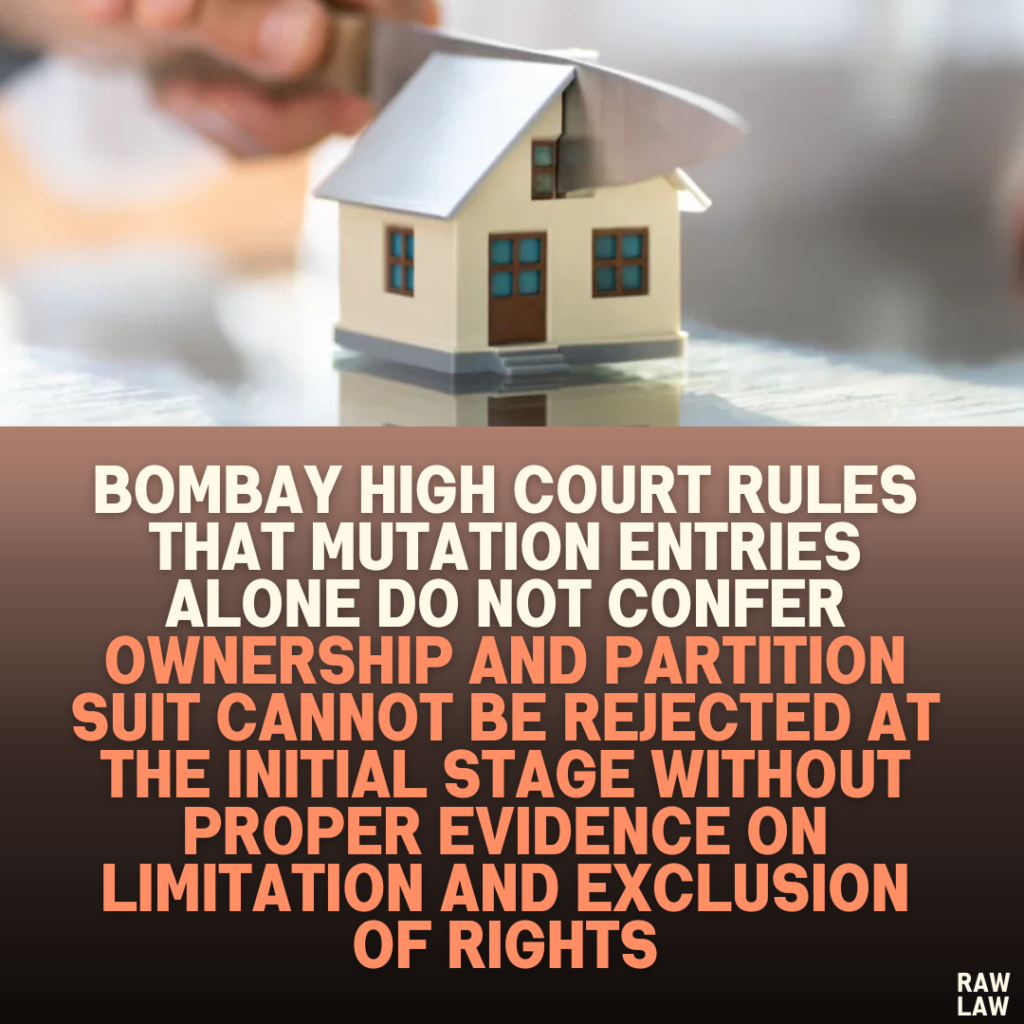1. Court’s Decision
The High Court dismissed the Civil Revision Applications and affirmed the trial court’s decision. The court ruled that the plaintiffs’ claims required factual determination through trial, and therefore, the suit could not be rejected at the initial stage. The court found that the issues of limitation and exclusion of rights required proper evidence before any decision could be made.
2. Facts of the Case
- The plaintiffs filed a partition suit seeking their share in ancestral properties.\n- The original owner of the property had multiple descendants, and over time, the property had been mutated in the names of different family members.\n- The defendants claimed absolute ownership based on past mutation entries and family arrangements that took place decades ago.\n- The plaintiffs argued that they were never excluded from the property and only recently discovered that the defendants were attempting to sell the property.\n- This discovery allegedly triggered the cause of action, leading to the suit.
3. Issues Raised Before the Court
The key legal questions the court had to address were:\n1. Does the plaint disclose a valid cause of action?\n2. Is the suit barred by limitation under Article 110 of the Limitation Act?\n3. Do mutation entries alone confer ownership rights?\n4. Was the plaintiffs’ exclusion from the property properly documented and legally valid?
4. Petitioners’ (Defendants’) Arguments
- The defendants argued that the suit was barred by limitation since the property had been mutated in their names as early as 1976, 2003, and 2008.\n- They claimed that the plaintiffs had no legal right over the property since it was already partitioned long ago.\n- They relied on multiple Supreme Court precedents to argue that if a suit is based on an illusory cause of action, it should be dismissed outright under Order VII Rule 11 CPC.\n- The defendants contended that mutation entries confirmed ownership and excluded any further claims from the plaintiffs.\n\n—
5. Respondents’ (Plaintiffs’) Arguments
- The plaintiffs argued that their cause of action arose only recently when they discovered the attempt to sell the property.\n- They maintained that mutation entries alone do not create ownership rights and that they still had a rightful share in the ancestral property.\n- The plaintiffs argued that they had never been formally excluded and that their exclusion must be proved through proper evidence.\n- They contended that limitation under Article 110 of the Limitation Act only began when they became aware of the exclusion, not when the mutation entries were recorded.
6. Analysis of the Law
- The court examined the provisions of Order VII Rule 11 CPC, which allow a suit to be dismissed if:\n – No cause of action is disclosed (Rule 11(a)).\n – The suit is barred by law (Rule 11(d)).\n- The Supreme Court has ruled in Dahiben v. Arvindbhai Kalyanji Bhanus, Raghwendra Sharan Singh v. Ram Prasanna Singh, and Murugan v. Kesava Gounder that a suit should be dismissed at the threshold if it is frivolous or barred by law.\n- However, in cases involving ownership disputes, courts have ruled that such issues require evidence and cannot be decided summarily.\n- The court reaffirmed that mutation entries alone do not confer ownership rights, and the exclusion of a co-owner must be established through clear evidence.
7. Precedent Analysis
The court referred to several landmark judgments:\n- T. Arivandandam v. T.V. Satyapal – Courts should dismiss frivolous cases but allow genuine disputes to go to trial.\n- Swami Atmananda v. Sri Ramakrishna Tapovanam – A cause of action must be real, not illusory.\n- Srihari Hanumandas Totala v. Hemant Vithal Kamat – A suit should be dismissed only if the limitation bar is apparent from the plaint itself.\n- The court observed that these precedents established a balanced approach—while frivolous litigation should be prevented, courts should not prematurely dismiss genuine property disputes.
8. Court’s Reasoning
- The court acknowledged that limitation and exclusion of rights were valid concerns raised by the defendants.\n- However, it noted that these issues could not be conclusively determined at the initial stage.\n- The court held that limitation under Article 110 of the Limitation Act starts from the date of knowledge of exclusion, and the plaintiffs had claimed that they only became aware of their exclusion recently.\n- The court reaffirmed that mutation entries do not create title, meaning that simply being recorded as an owner does not automatically exclude co-owners.\n- Since these issues required factual scrutiny, the court ruled that the trial court was correct in rejecting the application under Order VII Rule 11 CPC.
9. Conclusion
- The High Court affirmed the trial court’s ruling and held that the suit must proceed to trial.\n- It concluded that the issues raised by the defendants—limitation and exclusion of rights—required evidence and could not be decided at the preliminary stage.\n- Since the plaint disclosed a valid cause of action, it could not be dismissed under Order VII Rule 11 CPC.\n- The defendants’ application for summary dismissal was rejected, allowing the suit to move forward.
10. Implications of the Judgment
- Partition and ownership claims must be decided through evidence and cannot be dismissed solely based on mutation entries.\n- Mutation does not confer ownership—a party claiming exclusion of a co-owner must prove it with proper legal documentation.\n- Limitation in partition suits starts from the date of knowledge of exclusion, not from the date of mutation entries.\n- Courts must carefully scrutinize applications under Order VII Rule 11 CPC to prevent frivolous claims while ensuring that genuine disputes are not prematurely dismissed.\n- This judgment serves as an important precedent for property law cases, reinforcing that procedural bars must not be applied mechanically and should be assessed in light of the entire factual context.
